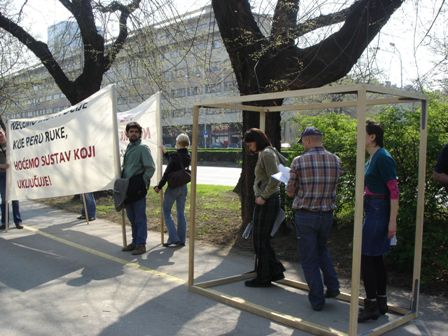In the last ten years, more than 1000 refugees have applied for asylum in Croatia. Only four – 4 applications have been approved. However, obtaining asylum in Croatia does not mean anything more than fighting for one’s existence and own rights in the new country.
Center for Peace Studies thus, appeals to media and public and reminds on numerous irregularities that characterize Croatian asylum system. So far only four asylum applications have been approved, although the number of applied asylum seekers is much higher. Croatian authorities obviously do not take in consideration the fact that those persons come from such countries and political regimes which are very dangerous and which seriously violate human rights.
Recently the Minister Tomislav Karamarko has, in behalf of the Ministry of Internal Affairs, declined to sign the Intention Letter on cooperation with the Center for Peace Studies, local associations and institutions of Kutina city, which would enable non-governmental organizations (NGOs) to provide wide range of useful social services to the Home for asylum seekers in Kutina.
City of Kutina would be in that way, also engaged in planning and social inclusion of asylum seekers in the daily life of their local community. This is very significant for asylum seekers in Croatia, since there is a situation where, even if they get approved of the asylum in Croatia, responsible ministries do not have adequately conducted and developed integration system of these persons in daily life of Republic of Croatia, and in general.
 Other responsible ministries, among Ministry of Internal Affairs, are : Ministry of Science, Education and Sport (MZOS), Ministry of Health and Social Care (MZSS) and Ministry of Economy, Labour and Entrepreneurship (MINGORP). They have not, until today, conducted or adopted adequate legal frames nor implemented the existing ones, which would enable the asylum seekers to learn Croatian language, find an employment, have adequate health protection and provide long-term solution of housing issue.
Other responsible ministries, among Ministry of Internal Affairs, are : Ministry of Science, Education and Sport (MZOS), Ministry of Health and Social Care (MZSS) and Ministry of Economy, Labour and Entrepreneurship (MINGORP). They have not, until today, conducted or adopted adequate legal frames nor implemented the existing ones, which would enable the asylum seekers to learn Croatian language, find an employment, have adequate health protection and provide long-term solution of housing issue.
Although certain regulations that deal with the asylum issues should have been adopted right after the adoption of the Law on Asylum that has been on power in Croatia since 1st of January last year, such thing did not yet happen, while those that were adopted are not implemented adequately, systematically and in coherence to the Croatian asylum policy. Asylum seekers are thus, left to themselves, while certain Croatian ministries refuse to have greater responsibility for the integration of this group of people.
However, the problem exists in the labour of the Commission for Asylum as well. The Commission is responsible body for the second level appeals of asylum seekers (for the first level appeals, the responsible body is Ministry of Internal Affairs). Although the Law envisions the representative of NGOs in the Commission, there is no such representative, instead there is the representative of Croatian Red Cross which is not even NGO, but organization established by Law. Also, the Commission for Asylum is not working transparently, since their activity reports are not available for public.
All from the above shows that the asylum system in Republic of Croatia is dysfunctional and does not operate in an adequate and fair manner. Thus, Center for Peace Studies demands from:
-
the responsible ministries to urgently conduct adequate policies (regulations, articles), build efficient institutional mechanism and improve the practices which will enable true, structurally complete and long-term integration of asylum seekers ;
-
the responsible ministries to, in cooperation with local government institutions and NGOs, develop practice of complete inclusion of asylum seekers in the community life ;
-
the Ministry of Internal Affairs become more open for initiatives of NGOs and true, participative and long-term cooperation ;
-
the Commission for Asylum fulfill its legal obligation and include in its work one representative of NGO sector, and thus, empower the transparency of its activities.
Related article:


